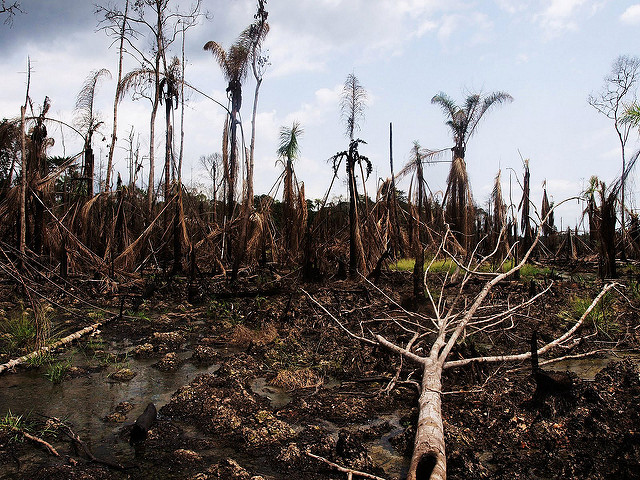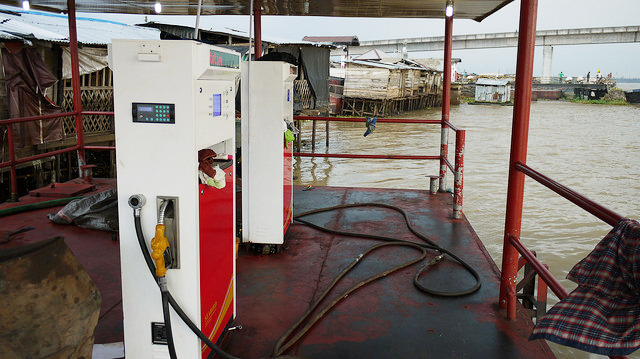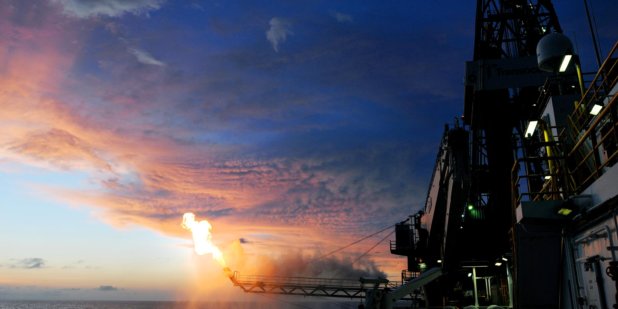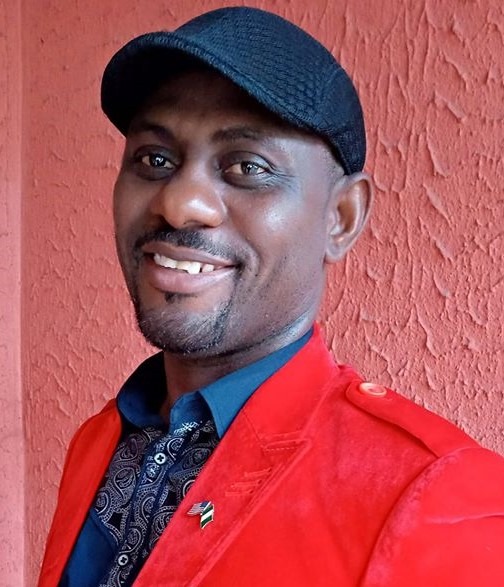- About
- Topics
- Story
- In-Depth
- Picks
- Opinion
- News
- Donate
- Signup for our newsletterOur Editors' Best Picks.Send
Read, Debate: Engage.
Having grown up experiencing firsthand the devastating impacts of oil spills in his village, Fyneface Dumnamene Fyneface could no longer keep quiet. He decided to be the voice of millions of ordinary people in Niger Delta who have everyday watched as their land become eclipsed by layers of filthy oil that have chocked their very existence.
Fyneface Photo
His cause got a breath of fresh air, with the assassination of Ken Saro Wiwa, an avid environment crusader who his mentor. Now Fyneface gets his hands dirty trying to rid the environment off the toxins, and when he is not, he is sitting with presidents and high profiled global personalities asking them tough questions about their resolve to help the people most affected by the oil business. He talked to Fairplanet about his quest to get justice for the indigenous people, the activities of Youth and Environmental Advocacy Centre Nigeria where he is a director and his campaign to recruit one million youth in his environmental justice journey by the year 2020.
fairplanet: What is your personal experience with the oil spill and the resultant environmental pollution in the Niger Delta?
Dumnamene Fyneface: I have a very in-depth understand of the oil spillage in Niger Delta. I was born here, have lived here and have being working here on these issues over the years. I have heard about oil spills in many communities, bushes and forests in the Niger Delta and have gone to see the spills myself and reported them to the oil multinationals and authorities with the hope that they would act.
When these spills occur, they destroy vast areas of farmland and crops. They spill into water bodies and kill aquatic lives. The air is also heavily polluted further compromising the quality of life of the people. Most of these spills occur as a result of corrosive pipes that were laid since the 1950s when oil exploration activities started in the Niger Delta region and have not been properly maintained or changed over the years. A few of these spills, no doubt also occur as a result of sabotage especially by youth that blow up the pipes to express anger and those who do so to pilfer the crude oil for artisanal refining at subsistence level.

You are a consistent crusader for the rights of the indigenous people living in Niger Delta who bear the brunt of the oil spills. You have done reports, held protests, presented your case to both the President of Nigeria and high profiled international actors. Why does this matter to you so much?
The issues of oil spills, pollution, environmental and human rights of the indigenous people of the Niger Delta are dear to my heart because when spills occur it is the indigenous and local people that suffer. Their livelihoods are destroyed, their farmlands are polluted and the fishermen are made to net oil instead of fish because the water bodies are polluted. It worries me as a crusader belonging to the young generation when I see the same issues that the late environmentalist, Ken Saro-Wiwa advocated for and died for still persisting in Ogoniland and the Niger Delta to date. It matters so much to me because, Niger Delta environment is being killed daily by the activities of oil majors and no longer able to sustain lives. The massive environmental pollution is affecting and cutting short human lives, affecting pregnant women and unborn babies, children are being born with deformities and others are sufferring from strange diseases.
I have put in my time and resources over the years campaigning and calling for a stop to further pollution of the Niger Delta environment and for the oil companies, Shell in particular, and the Federal Government of Nigeria to cleanup oil polluted sites so that fishing and farming, which are the major income earners for the local people, can thrive again. Thus, I will continue my advocacy till the Ogoniland and other polluted sites are cleaned up and the environment restored.
What exactly does your campaign involve and how easy or hard has it been?
My campaign is multifaceted. I seize every opportunity that I can to talk about environmental and human rights issues especially those that have a direct bearing on the lives of the ordinary people.
Part of my campaign involve visiting secondary schools, colleges and universities on the impacts of oil pollution to our environment and the need for them not to involve themselves in oil theft and artisanal refining that contribute to environmental degradation. My campaigns also involve live appearances on radio and television stations to campaign and create awareness on the worsening situation in Niger Delta.
In 2015, I took my environmental and human rights advocacy campaigns to the international community to paint a picture of the magnitude of the oil spills and the devastating effects they continue having on my people back home.
I was featured in The Stream programme of Al Jazeera and also appeared on Radio France International. I also took my message to students of San Francisco State University, California and also had the opportunity of presenting my campaign to the 71st Session of the United Nations General Assembly in New York in 2016 where I addressed the President of Nigeria and other world leaders on the environmental and human rights issues in the Niger delta region.
In 2017, I registered an advocacy platform called Youth and Environmental Advocacy Centre, YEAC, through which I also target to mobilize at least one million youth by the year 2020 to join me in campaigning for environmental, human rights and social justice for the indigenous people of the Niger Delta and Nigeria at large. My campaigns have been both hard and easy. It has been “hard”, yes, because, it requires and involve resources; it has been “easy”, yes, because of the passion and zeal I have to this cause.
Oil companies in the Delta attribute oil spills to third party activities including theft, pipeline vandalism and sabotage by the locals. What do you have to say to this?
The oil companies operating in the Niger Delta region always look for ways of shifting blame from their obvious undoing. They often blame the communities and third party activities in order to avoid paying compensation. In previous cases these oil companies have been forced to accept responsibility after independent audits revealed their culpability.
A classic case is the oil spill in Bodo Community in Ogoniland between 2008 and 2009. Shell that was responsible for those spills initially denied responsibility but when the community with a team of London lawyers dragged them to a high Court in London, Shell accepted responsibility and opted for an out-of-court settlement in which the company paid 55million British Pounds in compensation with a promise to clean up the oil spill, a project that is currently ongoing in Ogoniland. I am aware and cannot deny the fact that pockets of third party interferences including theft and vandalism do occur especially when the youth are expressing anger over the antagonistic tendencies and the divide-and-rule tactics of the oil companies and government. However, it is on record that the oil companies are responsible for 50 per cent of oil spills with just about 28 per cent attributed to activities of vandals and sabotage. The oil companies are never sincere. They operate with impunity because both the Nigeria laws and institutions are weak and do not have teeth to hold them to account.
Slain environmentalist Ken Saro Wiwa has always inspired your cause. How has his execution over 22 years ago shaped the fight against oil pollution?
The execution of Ken Saro-Wiwa has always greatly inspired the fight against oil pollution and environmental degradation in the Niger Delta region. 22 years down the line, people within and outside the Niger delta region are beginning to understand the message of environmental pollution, human rights of the indigenous people, resource control and environmental justice that Ken Saro-Wiwa zealously championed.
"Apart from those of us who are naturally inspired by Saro-Wiwa, we have seen numerous people including politicians adding their voices in calling for environmental justice."
The United Nations Environment Programme (UNEP) Report on Ogoniland published on August 4, 2011 has vindicated us, Ken Saro-Wiwa and all other Ogoni heroes and their campaigns that Ogoni environment was polluted. The execution of Ken Saro-Wiwa has shaped the campaign positively. The message is spreading and justice is nearer now more than ever. The great man never died in vain, and it is our resolve to honour his cause by doing what he so passionately believed in.
There have been various attempts over the years to roll out the Niger Delta clean up that have never quite taken up. What is the latest and is there hope that the cleanup will eventually take off?
Attempts have been made in the past to begin the cleanup but nothing tangible has taken place. The United Nations Environment Programme (UNEP) Report on Ogoniland was released on August 4, 2011 under the previous administration of President Goodluck Jonathan. That administration took some preliminary steps to implement the report. In 2012, the administration hurriedly set up the Hydrocarbon Pollution Restoration project (HYPREP) without a blueprint as they tried to counter a planned protest by the Ogoniland people who were celebrating one year since the release of the report while expressing bitterness at the lack of implementation of the findings.
The said HYPREP achieved very little. The only thing it can boast of ever achieving was erecting signposts at polluted sites and installation of water facilities in some communities for the recommended emergency measures.
The present administration of President Muhamadu Buhari continued from where the former administration stopped with very high hopes of commencement of the cleanup. It started with a flag-off in 2016, restructuring of HYPREP into Hydrocarbon Pollution Remediation project, the appointment of Board of Trustees, Government Council members as well as a project Coordinator, Dr. Marvin Dekil.
However, despite these promising and latest attempts to carry out the cleanup, the only thing we saw was a newspaper advertorial in mid-2017 for expression of interest for companies that would handle the emergency measures to bid for contracts.
People have lost hope in the oil companies and the government for overhyping the cleanup while paying lip service. Nobody knows when the Niger delta cleanup will eventually take off. Yet oil pollution is becoming catastrophic with each passing day.
You have been working with the Ogoni people, local and international organizations to implement the UNEP report on the clean up. What have you achieved so far?
So far, my work with the Ogoni people, local and international organizations to push for the implementation of the UNEP report has not been in vain despite the fact that we are still miles away in implementing the report. I joined and campaigned for creation of an Ogoni Environmental Restoration Authority as recommended by the UNEP report but HYPREP was instead, created in its place to not only clean up Ogoniland put also handle the clean-up of the larger Niger delta region. When we eventually accepted the Hydrocarbon Pollution Restoration Project in 2012, I joined in advocating for the scraping of the name ‘restoration’ because we couldn’t have restoration and hydrocarbon in the same sentence.
In response, President Buhari administration restructured the cleanup agency into “Hydrocarbon Pollution Remediation Project”. This was another achievement. My name and contribution features in the story of those who aggressively pushed to have the government institute the first steps to show their commitment to the cleanup. Since the release of the UNEP report, I have worked with other organizations and trained environment monitors to track and report the cleanup activities as recommended in the report. As the Research/project officer of Social Action, a local NGO, I have also written and published several monitoring reports and short update stories about the cleanup exercise and activities around the UNEP Report. Prominent among these reports is “Cleaning in a Vacuum, Still Polluted”, downloadable at www.saction.org.
I have made a vow to make sure that the recommendations of the UNEP report are implemented to the letter and I will stop at nothing until that happens.
Are you satisfied with the pace of the implementation?
No. I am not satisfied because this is the seventh year since the report was released and even the basic recommendations like provision of portable water to the people of Ogoniland still remains a pipe dream. The people of Ogoni especially the people of Nsisioken-Ogale in Eleme local government area where UNEP found Benzene in underground water, 900 times above World Health Organisation (W.H.O.) recommended standards still do not have portable water to drink
I am not satisfied with the pace of implementation because, seven years after the release of the report that said it would take between 30-35years for the clean up to be completed, nothing has happened and Ogoni people are dying in their numbers daily for living in polluted environment, drinking polluted water and eating crude oil polluted foods. I am not satisfied because, it seems the implementation of the report is being politicized. Government bureaucracies are delaying the implementation speed while lack of funds to HYPREP is compounding the issues with no date of actual implementation of the report at sight. I call on the oil companies and the federal government of Nigeria to fast-track the pace of the implementation and for once show their commitment to the wellbeing of the suffering people.
You have been consistent in arguing that multinational oil companies haven’t done enough to rid Niger Delta off pollution. What would be your idea of corporate accountability in this scenario?
My recommendation to the oil companies would be to adopt international best practices in their operations in the Niger delta region. There are pipelines that were laid in the region in the 1950s. They should be changed. The technology of those pipes and oil equipment are all outdated and expired. The oil companies should also embrace metering technology that is able to tell us what quantity of crude oil was pumped and transported from point A to B. This will enable us to know what quantity of oil is being produced and at what point spills or theft is happening and who is responsible. This will strengthen corporate accountability and restore people’s trust in government and players in the industry.

A situation where oil companies are not accountable and do not publish data of the actual quantity of oil that they pump does not reflect corporate accountability. Finally, oil firms should accept responsibility for the oil spills and stop criminalizing communities in the Niger Delta just to dodge payment of compensation and abdicate their responsibilities.
The call for clean-up has been described by some oil multinationals as a short term solution and sustainable measures like government accountability and taming theft and vandalism should be factored as long term results. What in your opinion should be the long term solution to restoring the Niger Delta ecosystem, protecting the environment and giving the people of the area back their healthy lives?
Cleanup is not a short-term solution, failure to tackle oil spills that lead to environmental pollution is where these multinationals should focus their attention. One of the most sustainable solutions is providing jobs to the many unemployed young people in the delta which would significantly cut down on oil theft and ultimately pollution. As the cleanup is currently being delayed, steps should be taken to get the boys out of the creeks and get them empowered to stop re-pollution as the cleanup sets in.
Youths and Environmental Advocacy Centre (YEAC) commenced advocacy and activities in the Niger Delta region to get the youth out of the creeks and end their contributions to new pollution. The event which was held under the auspices of “Niger Delta Ex-artisanal Refiners Forum” in 2017 if replicated to other areas has the potential to address one of the most controversial yet profound problems in the area once and for all.

